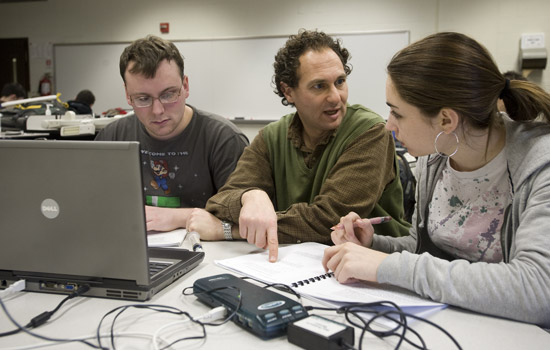‘Science’ prize to RIT’s Explorations in Physics
RIT and Dickinson College professors recognized for inquiry-based instruction
A. Sue Weisler
The award-winning Explorations in Physics course at RIT aims to engage non-science majors to investigate real world physics questions. Scott Franklin, center, professor of physics, works with third-year B. Thomas Golisano College of Computing and Information Sciences student Nicholas Rausch, left, and second-year College of Imaging Arts and Sciences student Allison Rose.
You learn science by doing.
Rochester Institute of Technology’s Explorations in Physics, an activity-based curriculum that engages non-science majors in the study of real-world physics questions, has been awarded the Science magazine prize for Inquiry-Based Instruction. The prize recognizes outstanding, inquiry-based science curricula proven to increase student learning.
Explorations in Physics, designed by RIT physics professor Scott Franklin and Dickinson College physics professors David Jackson and Priscilla Laws, aims to increase the scientific literacy of non-science majors through hands-on activities and student-directed projects.
“In the class, students are required to create, write and carry out their own experiment of their choosing,” says Franklin. “The students really take ownership of the project and appreciate it.”
Adds Laws: “The class is more of a learning of the process of how physics works, and less of the ‘cook-book’ lab style that deals with only equations and set instructions.”
At RIT, the course is offered twice a year for any non-science major. Classes like Explorations in Physics are a testament to the Science and Mathematics Education Research Collaborative, which seeks a culture change in the College of Science toward evidence-based teaching practice.
Editors of Science selected the explorations course with the assistance of a judging panel of teachers and researchers in the relevant science fields. An essay written by Franklin, Jackson, and Laws titled “An Inquiry-Based Curriculum for Nonmajors” will be featured in the Jan. 27 edition of Science.
“I believe in good science education for non-science majors,” says Jackson. “We hope to excite non-majors through this inquiry-based learning.”










